News
FG to start paying youth unemployment benefits to graduates, sets up consumer credit programme
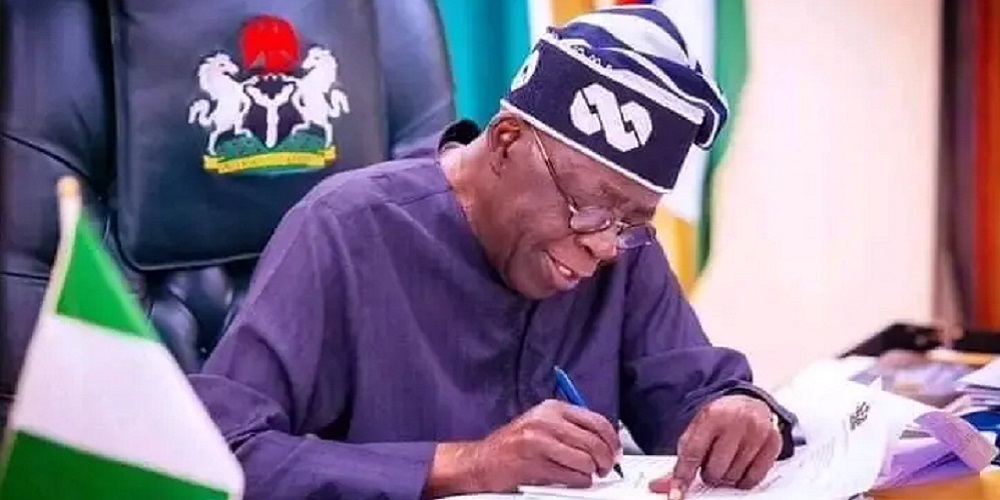
By Emmanuel Agaji
The Federal Government on Monday said it would extend its social security payments net to graduates with qualifications from NCE and upwards.
Addressing journalists after the Federal Executive Council meeting on Monday, the minister of finance and coordinating minister of the economy, Wale Edun, disclosed that the programme would see unemployed Nigerian youths being paid stipends.
“At this period of heightened food prices, Mr. President has committed to doing all that can be done to assist in giving purchasing power to the poorest and in that line.
“He has committed and instructed that the Social Security unemployment programme be devised, particularly to cater for the youth, for the unemployed graduates, as well as the society as a whole.
“So, we have coming, in the nearest future, an unemployment benefit for the young unemployed, in particular,” the Minister announced.
Similarly, Edun said the FG will urgently establish a consumer credit scheme to alleviate the pains of economic adjustment.
He explained that the Chief of Staff to the President, Femi Gbajabiamila, will lead a committee that includes the Minister of Budget and Economic Planning, the Attorney-General of the Federation and himself, the Coordinating Minister of the Economy.
“There is coming a social consumer credit programme. By making consumer credit available, goods become more affordable, the economy even gets a chance to revive faster, because people have purchasing power that allows them to order goods, products,” he stated.
Edun also spoke on the review implemented by the Special Presidential panel on the National Social Investment Programme, which has submitted a preliminary report to the president.
He noted that the president gave the highlights to the Council meeting noting that what was done was “a review of the existing mechanisms, a review of the existing programmes, and where there have been successes, such as the 400,000 beneficiaries of the GEEP programme.”
He added, “So, the direct payments to 12 million households comprising 60 million Nigerians is to resume immediately with the important proviso that every beneficiary will be identified by their national identity number and the bank verification number.
“Therefore, payments will be made into bank accounts or mobile money wallets. So, that whether it is before or after, there is verification of the identity of beneficiaries.
“Each person that receives 25,000 Naira for a total of three months will be identifiable, even after they have received the money, it will be clear who it went to and when it went to them. And that is the big change that has allowed Mr. president to approve the restart of that direct payments to beneficiaries programme.”
On his part, the Minister of Communications and Digital Economy, Dr Bosun Tijjani, explained that beneficiaries would be vetted through their Bank Verification Number and National Identity Numbers to avoid multiple payouts to one individual.
He said, “One of the initial moves that we’re making is leveraging the existing dataset that we have on our people. As you know, the BVN is well known to be extremely credible. NIN on the other side, which is now the most popular data identity system for Nigeriansm, is also to a largest and credible, and it covers quite a significant number of people as well.
“And what we’re looking to do here is the triangulation of this data set to ensure that not only are we using the register that has been properly populated, but that we also do proper verification of every individual that will benefit from that social investment programme, which means we will get commitment to ensuring that no one is paid twice, because you have to be properly IDed before you can benefit from that programme.”
News
R¶pe: S’African agencies hammer judge for acquitting Nigerian pastor
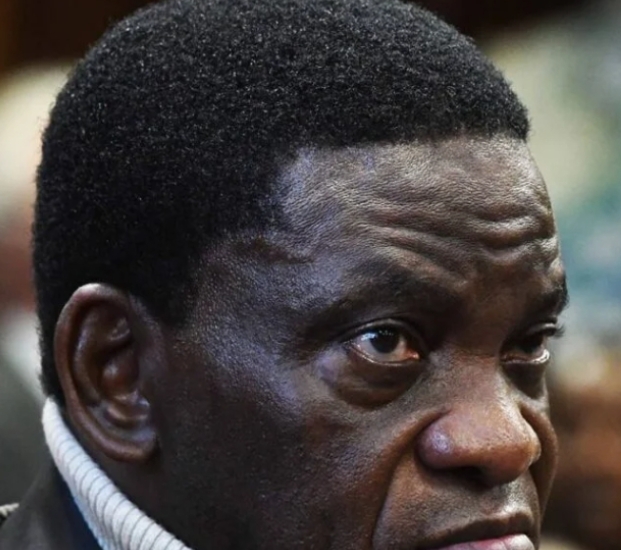
By Kayode Sanni-Arewa
Some South African government agencies have slammed the acquittal of a Nigerian televangelist, Timothy Omotoso, after spending eight years in detention for rape charges.
The South Africa-based Nigerian pastor alongside his co-defendants, Lusanda Sulani and Zukiswa Sitho, was discharged and acquitted of rape, sexual exploitation, and human trafficking by Gqeberha High Court on Wednesday.
Omotoso had been in jail since 2017 awaiting trial, following his arrest at the Chief Dawid Stuurman International Airport.
Delivering the verdict, the presiding judge, Irma Schoeman said Omotoso, the senior pastor of Jesus Dominion International, situated in Durban, was not guilty because his prosecutors had mishandled the case.
Also, the South Africa’s National Prosecuting Authority said, “former prosecutors in the case acted improperly and the accused were not sufficiently cross-examined by the state.”
But notable agencies, including the South Africa’s Justice Committee and the Department of Women, Youth and Persons with Disabilities, slammed the judge for her verdict.
According to South African media, the country’s Justice Department, while reacting on Thursday, slammed Schoeman and the NPA, describing Omotoso’s acquittal as an “assault on the fight against gender-based violence.”
The committee, chaired by Xola Nqola, said the sexagenarian’s freedom “is totally unacceptable”, adding that, “we need the National Prosecuting Authority to explain the weaknesses in the team and the case they presented.”
Similarly, the Department of Women, Youth, and Persons with Disabilities, in a statement, criticised the ruling, adding that it had only created doubt in South Africa’s judicial system.
“The acquittal of Omotoso represents a judicial turning point, one that risks undermining the faith that survivors have in the legal system,” the department stated. “Many women came forward bravely to testify about their horrific experiences, but the ruling will likely compound the emotional toll they have already endured.”
“This case highlights the complexity of gender-based violence and femicide, both of which require urgent, comprehensive, and coordinated action,” the statement continued.
It stated, “The fight against GBV is far from over, and while we respect the outcome of the case, it cannot deter us from our mission to create a safe and just society for women, youth, and persons with disabilities.”
The department concluded that it would not be deterred by this ruling, but, “Instead, it will only strengthen our resolve to work tirelessly for a South Africa that is safe, just, and empowering for all.”
Meanwhile, a political organisation in South Africa, ActionSA, had called for the deportation of the Nigerian cleric following his acquittal.
News
DANGER! Ex-Soldier Abubakar Affan Vows to Kill VeryDarkMan ‘Like Deborah Samuel’

On Friday, Abubakar Affan, whose social media profiles suggest he was a soldier with the Nigerian Army, threatened to kill Martins Vincent Otse, a social media influencer known as VeryDarkMan, if he “commits what Deborah did in Sokoto State”.
On May 12, 2022, Deborah Samuel was publicly stoned and burnt to death by a group of unruly students and Islamic extremists at the Shehu Shagari College of Education over an allegation of blasphemy against Prophet Muhammed (SAW) on a WhatsApp group.
Recently, 16 men identified as northern hunters were burnt alive in Uromi, Edo State. Their deaths caused national outrage and demands for justice.
On Friday, Otse reminded the public about the need for justice to be done in the case of Deborah Samuel in the same vein.
“Arresting and prosecuting the killers of Deborah would bring justice and unity to Nigeria to a large extent. Fish out Deborah’s killers just like the Uromi 16 killers were arrested. I stand for justice,” Otse posted on his X handle.
A screenshot image of Abubakar Affan’s quote in response to Otse’s post.
The social media influencer attached a collage picture of the victim and one of her killers at the scene of the killing to the post.
Nigerians on X engaged the post in hundreds, echoing Otse’s sentiment.
However, Affan quoted the post with a direct threat to the influencer. Affan said he would kill Otse if he did what Deborah Samuel was accused of “today”.
“If, today, you committed what Deborah did in Sokoto, I’ll find you and send you where she’s now,” Affan posted, adding a cartoon depicting different levels of reactions to mob killings in Lagos, Sokoto and Edo. His post is archived here.
Abbakar Affan.
“The hypocrisy of the animal we share country (sic) with. Bunch of gays,” Affan added.
WHAT AFFAN’S DIGITAL FOOTPRINTS SAY ABOUT HIM
The quote has garnered over 411,000 impressions. Curiously, over 1,647 accounts have liked it, suggesting an impressive number of people shared Affan’s extremist sentiment.
A peep into his X profile showed that he spent four years in the northeast with Nigerian troops combating Boko Haram terrorists.
Boko Haram and ISIS terrorists got recruits by twisting and manipulating Islam, Affan said in an article posted by Strike Source, a security news website. The website was unsafe at press time because its secure site lock (SSL) certificate had expired.
“Many of their [ISIS] recruits are Nigerians from neighboring countries that speak Kanuri. They twist the words of the Koran and take advantage of the lack of education. By using a faith as a weapon, they tell them that the military is the enemy because they don’t follow their version of Islam, and that we are pagans,” Strike Source quoted Affan to have said.
On March 19, he shared that he had quit his job in the army.
A screenshot of Affan’s post talking about his military experience in the northeast.
On his LinkedIn profile, he described himself as a former soldier who enlisted in the Nigerian Army in 2012:
“I’m Abubakar Affan, a dedicated and highly skilled special forces officer of the AFS with a passion for counter-terrorism operations and combating extremism. With nearly a decade of experience in the Armed Forces, I take immense pride in serving my country and contributing to the safety and security of the nation.
“I embarked on my journey in the military in 2012, enlisting in the Nigeria Army Armed Forces. My foundational military training at the prestigious Nigeria Army Depot in Zaria laid the groundwork for my subsequent growth as a specialized operative.
“For the past six years, I have been actively deployed in counter-terrorism operations in northern Nigeria, engaging and neutralizing extremist groups with unwavering determination. Throughout the service, I Abubakar has had the honor of being part of various Special Forces units, honing, skills and expertise in tackling complex security challenges.”
News
CBN not happy over debt servicing as FX reserves drop $2bn

Nigeria’s gross foreign exchange reserves fell by $2.57bn from January to March 2025, marking a 6.29 per cent decrease over the three-month period.
This was revealed in external reserves data available on the website of the Central Bank of Nigeria.
Earlier this week, the CBN attributed the decline in the country’s foreign exchange reserves during the first quarter of 2025 to the burden of foreign debt servicing.
On January 2, 2025, Nigeria’s foreign exchange reserves stood at approximately $40.88bn but dropped to $39.72bn by the end of the month.
By the end of February, the reserves fell further to $38.42bn, representing a decline of $1.3bn within one month, equivalent to a 3.27 per cent decrease.
The downward trend continued into March as the reserves dropped to $38.31bn by the end of the month. This represents an additional reduction of $110m, translating to a 0.29 per cent decline compared to the previous month.
The combined month-on-month decreases led to a total quarterly drop of $2.57bn, representing a cumulative decline of 6.29 per cent over the first quarter of 2025.
Despite the strong reserves position at the end of 2024, the first quarter of 2025 witnessed a reversal, primarily driven by the need to service foreign debts.
The CBN noted that the first quarter figures reflected seasonal and transitional adjustments, including significant interest payments on foreign debt.
These obligations have been a consistent pressure point, leading to a drawdown of reserves despite the improvements observed in the preceding quarter.
In a statement, the CBN said, “Reserves have continued to strengthen in 2025. While the first quarter figures reflected some seasonal and transitional adjustments, including significant interest payments on foreign-denominated debt, underlying fundamentals remain intact, and reserves are expected to continue improving over the second quarter of this year.”
Data from the CBN revealed that Nigeria’s total debt service payments amounted to $540m in January 2025 and $276m in February 2025.
This means that a total of $816m was spent on foreign debt servicing in the first two months of the year.
The significant outflow in January was attributed to scheduled foreign debt repayments, creating substantial pressure on the reserves.
The reduction in February’s debt servicing to $276m provided some respite, but high debt obligations continued to weigh on reserve levels.
Despite the decline in the first quarter, the CBN remains optimistic about a rebound in reserve levels as oil production improves and non-oil FX earnings are expected to rise.
The apex bank expressed confidence that improved oil production levels and a more supportive export growth environment would boost non-oil FX earnings and diversify external inflows.
The bank has reiterated its commitment to prudent reserve management, transparent reporting, and macroeconomic policies that aim to stabilise the naira, attract investment, and build long-term economic resilience.
-
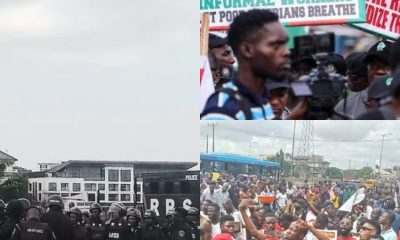
 News17 hours ago
News17 hours agoSecurity Alert: Police alert officers ahead of nationwide protest over living costs, free speech
-
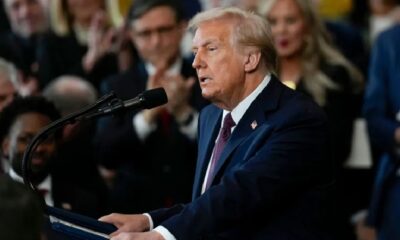
 News16 hours ago
News16 hours agoVOA Halts Operations In Nigeria, Others Over President Trump
-

 News6 hours ago
News6 hours agoWhy NYSC maybe extended by FG- Minister
-
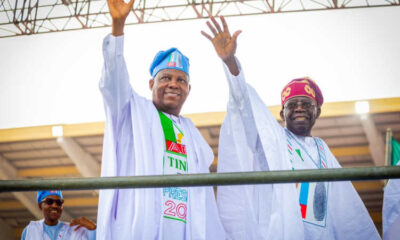
 Politics2 hours ago
Politics2 hours agoTinubu Gives Fani Kayode, Others New Appointments (See Full List)
-

 News16 hours ago
News16 hours agoPolice rescue 14 kidnapped passengers of Benue Links
-
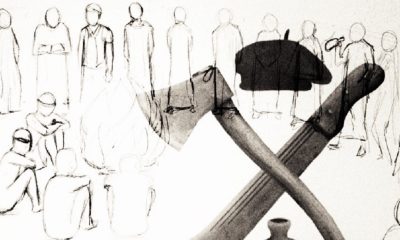
 Metro6 hours ago
Metro6 hours agoHow I was robbed of N15.5 million by my girlfriend, her brother, and a group of cultists
-

 News2 hours ago
News2 hours agoDANGER! Ex-Soldier Abubakar Affan Vows to Kill VeryDarkMan ‘Like Deborah Samuel’
-

 Economy5 hours ago
Economy5 hours agoCBN allocates $197.71m into FX market to support naira




